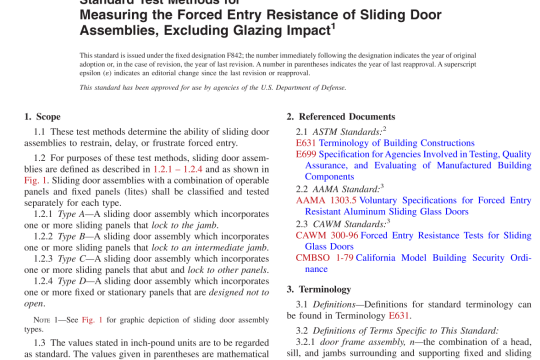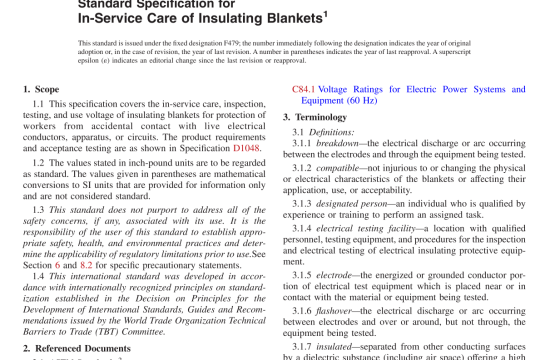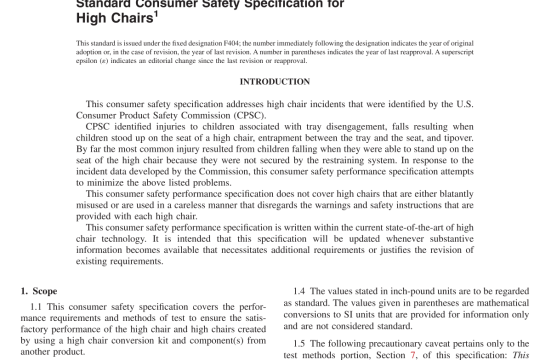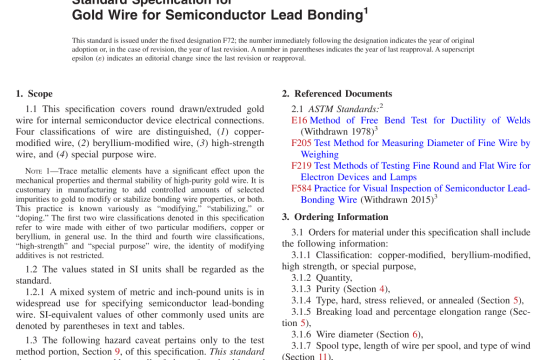ASTM D4078-02(R2021) pdf free download
ASTM D4078-02(R2021) pdf free download.Standard Specification for Water Emulsion Floor Polish
1. Scope
1.1 This specification covers floor polish intended for use on all nonwood floors and on sealed-wood floors. 1.2 This standard does not purport to address all of the safety concerns, if any, associated with its use. It is the responsibility of the user of this standard to establish appro- priate safety, health, and environmental practices and deter- mine the applicability ofregulatory limitations prior to use. 1.3 This international standard was developed in accor- dance with internationally recognized principles on standard- ization established in the Decision on Principles for the Development of International Standards, Guides and Recom- mendations issued by the World Trade Organization Technical Barriers to Trade (TBT) Committee.
2. Referenced Documents
2.1 ASTM Standards: 2 D1290 Test Method for Sediment in Water-Emulsion Pol- ishes by Centrifuge D1455 Test Method for 60° Specular Gloss of Emulsion Floor Polish D1791 Test Method for Accelerated Aging of Liquid Water- Emulsion Floor Polishes D1792 Test Method for Long-Term Removability Properties of Emulsion Floor Polishes D1793 Test Method for Water Spotting of Emulsion Floor Polishes D2047 Test Method for Static Coefficient of Friction of Polish-Coated Flooring Surfaces as Measured by the James Machine D2048 Test Method for Powdering of Floor Polish Films D2834 Test Method for Nonvolatile Matter (Total Solids) in Water-Emulsion Floor Polishes, Solvent-Based Floor Polishes, and Polymer-Emulsion Floor Polishes D3052 Practice for Rating Water-Emulsion Floor Polishes D3153 Test Method for Recoatability of Water-Emulsion Floor Polishes D3206 Test Method for Soil Resistance of Floor Polishes D3207 Test Method for Detergent Resistance ofFloor Polish Films D3209 Test Method for Freeze/Thaw Resistance of Polymer Floor Polishes D3210 Test Method for Comparing Colors of Films from Water-Emulsion Floor Polishes E70 Test Method for pH of Aqueous Solutions With the Glass Electrode
3. Requirements
3.1 Nonvolatile Content (Total Solids)—The nonvolatile content shall be agreed upon between the purchaser and seller, and shall be determined by Test Method D2834. 3.2 Sediment—Any sediment present in the product shall be soft and free of grit. The amount of sediment shall not exceed 0.2 % when tested as specified in Test Method D1290. 3.3 pH—The pH of the product shall not be greater than 10.0 when tested as specified in Test Method E70. 3.4 Stability: 3.4.1 Heat (Accelerated Aging)—When tested as specified in Test Method D1791, the product shall develop no offensive odor, exhibit minimum creaming, gelling, or separation, and display less than 10 % loss of 60 ° specular gloss when tested as specified in Test Method D1455. 3.4.2 Freeze/Thaw Resistance—When tested as specified in Test Method D3209, the product shall exhibit minimum creaming, gelling, or separation, and display less than 10 % loss of 60 ° specular gloss when tested as specified in Test Method D1455. 3.5 Color—Color, as expressed by the whiteness index, shall be measured as specified in Method D3210. The product shall be equivalent or have less discoloring effect when compared to the control floor polish specified in 3.15. 3.6 Odor—The product shall have no offensive odor. 3.7 Visual Gloss—The visual gloss shall be equivalent to the control floor polish specified in 3.15. Utilize the visual gloss method in Practice D3052 rather than the 60 ° specular gloss determination by gloss meter.
3.8 Recoatability—The dry film shall have at least a FAIR rating, preferably GOOD, when tested as specified in Test Method D3153 (Bench Panel Test). 3.9 Water-Spotting—The dry film shall show minimum whitening, color change, change in appearance, or removal of film when tested as specified in Test Method D1793. 3.10 Detergent Resistance: 3.10.1 This requirement is optional and should be used only for those products presented as being detergent resistant. 3.10.2 The dry film shall have at least a GOOD rating, when tested as specified in Test Method D3207. 3.11 Resistance to Soiling: 3.11.1 The dry film shall have equivalent or superior resis- tance to soiling as compared to the control floor polish specified in 3.15, when tested as specified in Practice D3052. 3.11.2 If a bench test method is preferred, the dry film shall have an equivalent or superior resistance to soiling as com- pared to the control floor polish specified in 3.15 when tested as specified in Test Method D3206.




